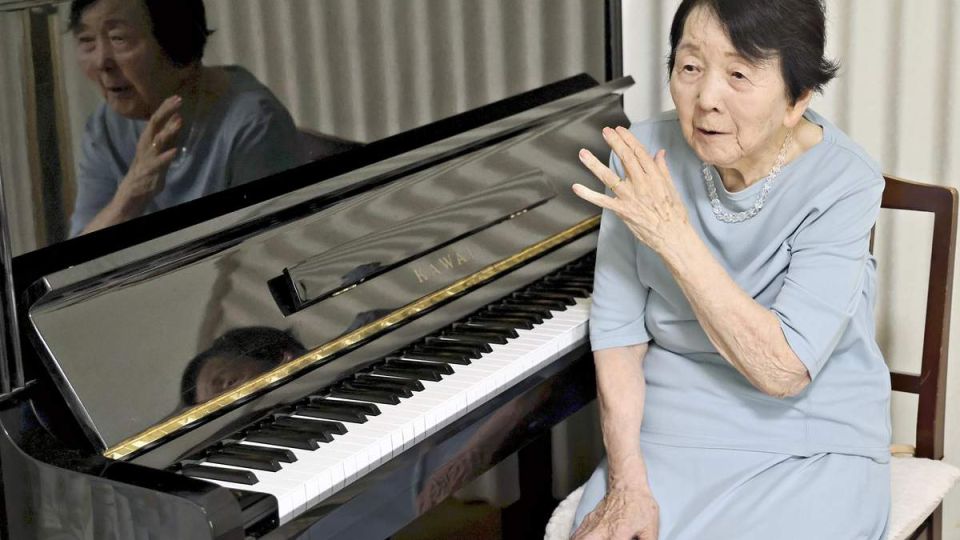
TOKYO – There is a classical piece that 98-year-old pianist Reiko Kinashi has played since before World War II — Schumann’s Traumerei.
The nostalgic melody of the piece, which means “dreaming” in German, didn’t fade even amidst Kinashi’s wartime experiences, instead remaining in her heart.
Kinashi, a former music teacher, was born in a Christian family in Takamatsu seven days after the start of the Showa period (1926-1989). It was a dark time with the economic crisis and the rise of the military.
Kinashi attended a local church with her parents every week. Her aunt, the pastor’s wife, was the church pianist and Kinashi began learning piano from her when she was four years old.
“The mysterious melody drew me into a fantastic dream world.” That was Kinashi’s first impression upon hearing her aunt play Traumerei when she was around 12. After first hearing the piece, Kinashi practiced diligently until she was able to play it three years later. She decided to become a music teacher in the future.
ALSO READ: Japan’s ghost story boom triggered by social conditions
Japan and the United States declared war on each other in December 1941, when she was 14. Around the same time, Kinashi met a tall and slender male student. He was an aspiring musician who had dreamed of becoming an apprentice to composer Kosaku Yamada.
Kinashi sometimes heard the sound of wooden clogs outside when she was at home on the second floor. If it was followed by the whistling of the song “Akatombo,” that was a sign that he had come to visit her. During that time, a young couple walking together on the street were considered imprudent. They would meet at a park and ride a small boat on the pond.
Kinashi took him to the church and played Traumerei for him. Standing beside the piano, the student said nothing but gave her a gentle gaze. Her heart fluttered as she thought that the music was echoing in his heart as well. They vowed to each other to “cherish our lives in the wartime.”
One day, the man visited Kinashi’s home and bowed to her parents, “I would like your approval to marry your daughter.” He confessed that he had received his draft notice and was headed for the battlefield, telling her, “Please wait for me until I return.” That was the last time she saw him.
Kinashi, too, was drawn into the war. In February 1945, while she was a student at a local school for teachers, she was mobilized to work at a factory in Handa, Aichi Prefecture. At a factory where “Increase production” was the slogan, she worked on a production line for naval reconnaissance aircraft. She endured the deafening noise of metal plates being fastened together with bolts as she worked on the fuselage.
READ MORE: Japan's 'death-tainted' homes gain appeal as property prices soar
In July, just before the end of the war, Kinashi was caught in machine gun fire from a US military aircraft near the factory. The sharp sound of bullets piercing the ground grew closer. Suddenly, the sound changed to a dull thud. She turned around and saw her friend lying on the ground, covered in blood from a gunshot wound.
Kinashi said having a piano in her dormitory helped her endure the difficult circumstances. At her friends’ request, she played Traumerei. They closed their eyes and let the melody wash over them.
“In that moment, I forgot all the bad things,” she said.
The war ended in August 1945. Her home was destroyed in an air raid, so she commuted to a teaching school from a relative’s house nearby and became a teacher, fulfilling her lifelong dream. Her supervisor at the elementary school where she worked recommended a marriage match, but Kinashi refused for the first year, still waiting for the music student to return. Later, she got married, through an arranged marriage, to a man who eventually passed away at the age of 69 in 1994.
READ MORE: Rising rice price in Japan to make national beverage unaffordable
While Kinashi was a music teacher, she moved between elementary and middle schools while supervising choir clubs. She worked tirelessly, even on weekends. During summer break, she stayed at a temple for the clubs’ intensive training sessions.
Kinashi wanted her students to feel that music does not cause conflict; it unites hearts across gender and nationality. To prevent another war like the one that took away the life of the man she loved, she has decided to play Traumerei and live for the man who had his dreams shattered.
Her belief in music has resonated with those around her. Almost ten of her students have become music teachers. She created a happy family with her husband. Their eldest son, 75, studied vocal performance, while his wife, 73, plays the ocarina, and their two grandchildren are also musicians. Her family holds concerts within and outside the prefecture, playing Traumerei.
Kinashi begins her two-hour-long daily practices by playing the piece five times.
“This piece is now a part of me,” she said as she strokes the keys while closing her eyes. She said she wants to express through her playing that even the war, which claimed many lives and left indelible scars on survivors’ hearts, cannot take Traumerei away from her.


